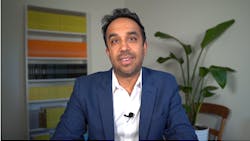Neil Pasricha didn’t cut away to what he calls “flashy PowerPoint videos and slides.”
The NY Times bestselling author and TED speaker spoke to Safety 2020 attendees about positive psychology and how someone can build resilience during difficult times.
Pasricha's story began ten years ago when he was happily married, working at Walmart as the director of leadership development. One night, his wife asked for a divorce. Upset with the news, he called his friend to discuss the development. The next morning, he received a phone call from his friend’s sister that his friend had died by suicide. Over the next four years, he started a blog called 1000AwesomeThings.com. The blog was his way of processing the heartbreak mentally and emotionally.
He explained, "I was sitting at home alone with a lot of heartbreak asking myself how to get back out there again.”
It took Pasricha years to begin to trust himself again, to build up his confidence and to eventually meet somebody new - his current wife Leslie. When he discovered she was pregnant with their first child, he began penning a letter to his unborn baby. The letter turned into 300-page novel.
“I tried to channel all the heartbreaks and frustrations I had had over the last few years of my life with everything that I had learned on how to change my own mind into one of positivity," Pasricha said.
As his journey continued and he had two additional children, Pasricha began to notice that something was different about them. He began to research this hypothesis, discovering a spike
He told attendees, "Anxiety rates among children and young adults and adolescents are spiking. Depression rates are spiking. Stress rates are spiking. Loneliness rates are spiking. And even suicide rates are spiking. All of these were spiking before the pandemic. We’re facing an unprecedented mental health crisis right now. On top of the stats I was just talking about.”
The issue, Pasricha determined, is that many people have not developed tools to handle failure, but there is an urgent need to learn them. One way this can happen is to switch to a positive frame of mind.
"More than anything else, we probably know this intuitively on a gut level but when we can do that when we can change our brain into one of positivity and guess what? Our productivity is up 31%. Our sales go up 37%. Our creativity triples and that’s on top of a whole host of other benefits that we get from being positive," he said. “Right now it is so hard to be positive.”
Safety 2020 attendees then heard Pasricha's three ways to ground and center themselves during a time when positivity and resilience are crucial for surviving everyday life.
1. Two-minute mornings.
"How many of you check your cellphone right before bed? How many of you check your cellphone first thing when you get up in the morning? How many people sleep within 10 ft of their cellphones," Pasricha asked the virtual audience.
The answer, according to research, is more than 90%. He drove home the point by adding, "We are all phoneaholics now and we do not see how addicted we are."
A solution to this issue is creating a two-minute morning ritual that happens before a person gets out of bed. After waking up, the last thing someone should do is pick up their smartphone. Instead, it should be placed out of the room completely, and a traditional alarm clock should be used.
The next step is to keep a notebook and pen at the bedside. Each morning a person should write down the following three things to get in a positive mindset:
1. “I will let go of…”
"Crystallize and reject from your brain one thing that you are stressed about, worried about or overthinking about," Pasricha explained. "It gets removed from the subconscious part of your brain."
Once this occurs, a person can live with less anxiety and more contentment.
2. “I am grateful for…”
Research shows that those who write down gratitudes are not just happier, but physically healthier. The key, Pasricha said, is that these need to be meaningful and specific gratitudes.
“It’s human nature – we look for problems, we find problems we try to fix problems," he said. "If you focus your neuropathways on the positive, then you will be able prime your neuropathways for positivity throughout the entire day."
3. "I will focus on..."
People more than ever are suffering from severe decision fatigue, Pasricha told the audience. They have had to make the decision to wash their hands more often, wash groceries and other preventative safety measures that they weren't used to before the pandemic.
Writing a specific target of focus "forces you at the beginning of the day to carve a will-do from your endless could-dos and should-dos."
This will enable a person at the end of the day to cross that item off and to feel like they have moved forward, "a very powerful thing for you to feel, especially as we all go through this together," he said.
2. Have a weird hobby.
Cognitive entrenchment is the thesis that as a person gets older and does the same roles for a longer time that it leads to mental fragility.
Pasricha pointed to research that examined how accountants newer to the profession are better able to implement tax laws compared to those with years of experience.
"Their brain gets caught up on how things should be done," he said.
"We are served well when we have a strange, unusual or weird hobby in our lives."
Noble prize winners are doing balloon animals on the side. They're teaching magic at kids' birthday parties. Glass blowing.
"To him that observes from afar it appears they are scattering and dissipating their energies, while in reality they are channeling and strengthening them" Santiago Ramon
Your learning rate is the steepest when you know the least.
increase mental resilience and avoid the mental trap that comes from doing the same thing over and over.
3. Go untouchable.
Going "untouchable" can be likened to the concept of intermittent fasting, Pasricha discussed. The longer a person can go without using a cellphone, the greater it will be for their health.
Pasricha stressed once again the ever-increasing reliance on cellphones and connectivity. He cited research from Dr. Jean Twenge that found a 30% spike in anxiety rates "due to the ascendance of the smartphone."
"You're not giving your brain any restful space from the entire flood of the frenetic news media, the endless dings and pings that I'm sure you get from your coworkers or boss, the text messages you might get from your friends or your family," he told attendees.
The best way to combat this issue is to begin plugging the cellphone in areas away from the bedroom and set it on airplane mode. Decide what time to go offline each day and what time to go back online the next morning.
"Even the idea that you give yourself a set amount of time to be unplugged will help," Pasricha said. "It allows your brain to get into the softer more relaxing state it needs to regenerate and recharge for the next day."
Pasricha pointed to studies that show a correlation between unplugging each day and a reduction in stress.
He concluded, "if we can do some of these mind-strengthening activities, we can increase our mental resilience. We reduce our mental fragility."
About the Author

Stefanie Valentic
Stefanie Valentic was formerly managing editor of EHS Today, and is currently editorial director of Waste360.
